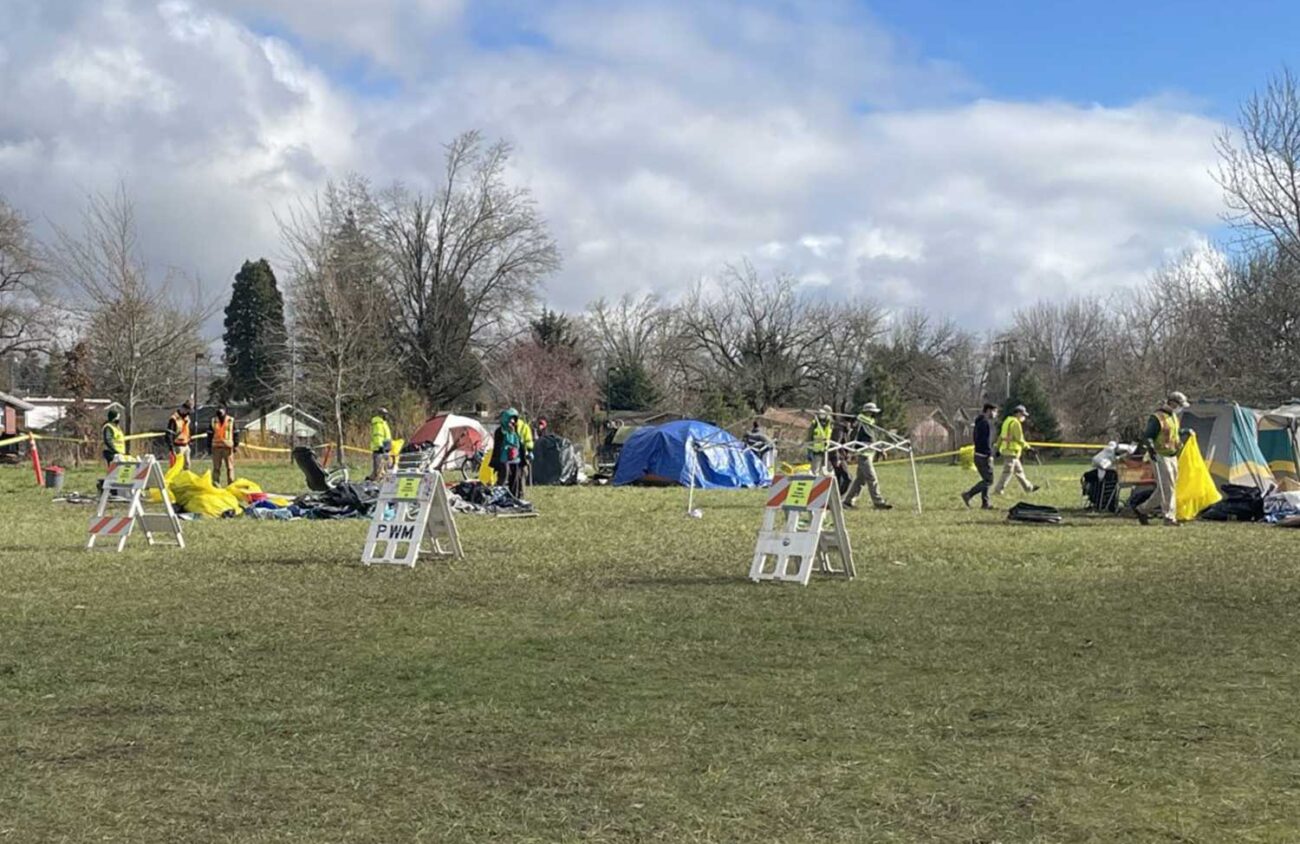For nearly four years, the city of Eugene has been skirting a state law that requires unhoused people camping in public to receive a 72-hour notice before city workers force them to remove their tents.
Instead, Eugene officials have told city workers to give many unhoused people only two hours’ notice before evicting them and clearing away their tents and other belongings.
Four unhoused people sued the city last year, asking a judge to stop what they believed to be an unlawful practice.
Last month, a Lane County Circuit Court judge ruled the city’s rationale for ignoring the law was flawed. But at the same time, Judge Debra Velure found loopholes in the law that allows city workers in many cases to keep clearing homeless encampments without regard to the 72-hour notice law.
Heather Marek, who represented the plaintiffs, acknowledges the lawsuit failed to halt the rapid removals in parks and open spaces.
Adding insult to injury, she says that the city asked the Lane County Circuit Court to make the homeless plaintiffs pay its legal bills. The court agreed — ordering most of them to cough up more than $1,000 each in fees.
“These are individuals who lack housing because they are in poverty, and they are just trying to get the city to respect their rights and follow the law,” Marek, with the Oregon Law Center, tells EW. “These protections are to ensure that people can connect with services and that they’re able to get out of this cycle of homelessness.”
Amber Allen, a housing and homelessness communications manager for the city of Eugene, declined to comment on the judge’s ruling because the case is still subject to appeal. She also declined to say whether city workers are still forcing unhoused campers to move with only two hours’ notice.
Pauline Krieger, one of the plaintiffs, says there’s no sign the city has slowed down.
Krieger, who remains unhoused, says she rarely receives a formal notice from the city to move her camp. Instead, she says, city workers give verbal orders to go immediately. The rapid evictions are exhausting, she says, frequently causing her to lose her belongings, making it difficult to hold down a job or escape homelessness.
“The city and police found a way to go around all the laws that are put there to protect us,” says Krieger, 56. “They found a way to criminalize homelessness.”
A crusade against camps
Eugene Weekly first exposed the city’s practices in April 2023 [See “Fast and Furious,” EW, April 13]. The article showed city officials had invented a two-hour notice to unhoused campers soon after the 2021 Legislature extended the legally mandated deadline to 72 hours.
The law says established camps require 72-hour notice before removal, but the Legislature never defined “established.” City officials made up their own definition, deciding any tent that had not been up for at least a day was not an established camp.
The policy triggered a wave of homeless sweeps against unhoused campers in parks and open spaces — common areas for homeless people to go when they want to stay out of the way. State law exempted the need for notices if the prohibited camping was taking place in a “day use recreational area,” such as parks or open spaces.
Public works employees increasingly slapped camps with two-hour notices to leave hours after they appeared and subsequently removed them, whether the camper was there or not.
Documents showed city workers had issued nearly 1,400 rapid eviction notices between October 2021 and April 2023, driving homeless evictions to a seemingly all-time high. Fewer than half the eviction notices gave unhoused campers 72 hours’ notice, as state law described.
After the story’s publication, four people living unsheltered in Eugene — Pauline Krieger, Carli Grimes, Alison Hunter and Jason Bowman — filed a lawsuit against the city of Eugene in January 2024.
The judge, Velure, shot down the city’s argument that camps had to be erected for at least a day to be considered “established.” She also brushed aside the city’s argument that state law applied only to law enforcement, and that city work crews were exempt.
But Velure sided with the city’s other arguments — that the 72-hour notice did not apply if tents were set up in parks or other public open spaces, or if the city believed the tents violated other laws, such as those prohibiting trespassing, littering and disorderly conduct.
In short, the city can continue its rapid camp removals. It just has to change its reasoning.
The cost of fighting back
By the end of the case, Krieger was the only plaintiff left out of the original four. Despite being homeless, she maintains a full-time job at a vineyard and made it to her required appointments for court.
The other plaintiffs, however, did not.
Grimes got into housing in another state and missed her deposition as a result. Bowman and Hunter wrote the court several times, saying that disabilities and other issues prevented them from making their depositions.
“These cases are incredibly difficult for people to participate in when their lives are already complicated,” Marek says.
Grimes, Bowman and Hunter eventually dropped out of the case, and city attorneys convinced the judge to make them foot some of the city’s legal bills. The court ordered the three plaintiffs who dropped out to pay the city’s attorneys fees and other costs. Grimes owes $1,285.20 and Bowman and Hunter each owe $1,026.95 — all at 9 percent interest a year until paid.
Marek said compelling unhoused people to pay individual fees will only discourage others from fighting for their rights in court against the city.
“Homeless individuals will be in a position of choosing between accessing the courts or housing,” she wrote to the court. “That will shut vulnerable people, who already experience significant barriers to justice, out of the legal system.”
